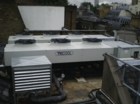Tricool responds to planning challenge for chiller replacement in Mayfair

Specially designed and made to meet stringent planning requirements are these two Tricool chillers for a hotel in London’s Mayfair.
The low profile of two Tricool chillers installed as part of the replacement of the air-conditioning and ventilation systems for the Hilton London Green Park Hotel in Mayfair was a key element in obtaining planning permission. This hotel is in an area protected by stringent building regulations and aesthetic requirements to protect the area’s rooflines. Howard Electrical was given the task of replacing chillers that cooled public areas and back of house. A straightforward model upgrade was initially considered, but it became apparent that a customised approach was needed to address space constraints and aesthetic considerations. Tricool was asked to design and make a solution. Westminster Council also required the new chillers to be identical to those being replaced or have a smaller footprint and lower profile to as not to alter the area’s skyline. A lower noise output was also stipulated. Tricool custom built two specialist low-profile SCC132 chillers, each with a cooling capacity of 132 kW and using R407C. One is used at standby. Each chiller has three stages of cooling control, three 800 mm-diameter axial and a single-circuit shell-and-tube heat exchanger. Noise levels are 58 dB(A) at 10 m. They were craned into position.
For more information on this story, click here:
July, 08 83 Related links:
Related articles:


